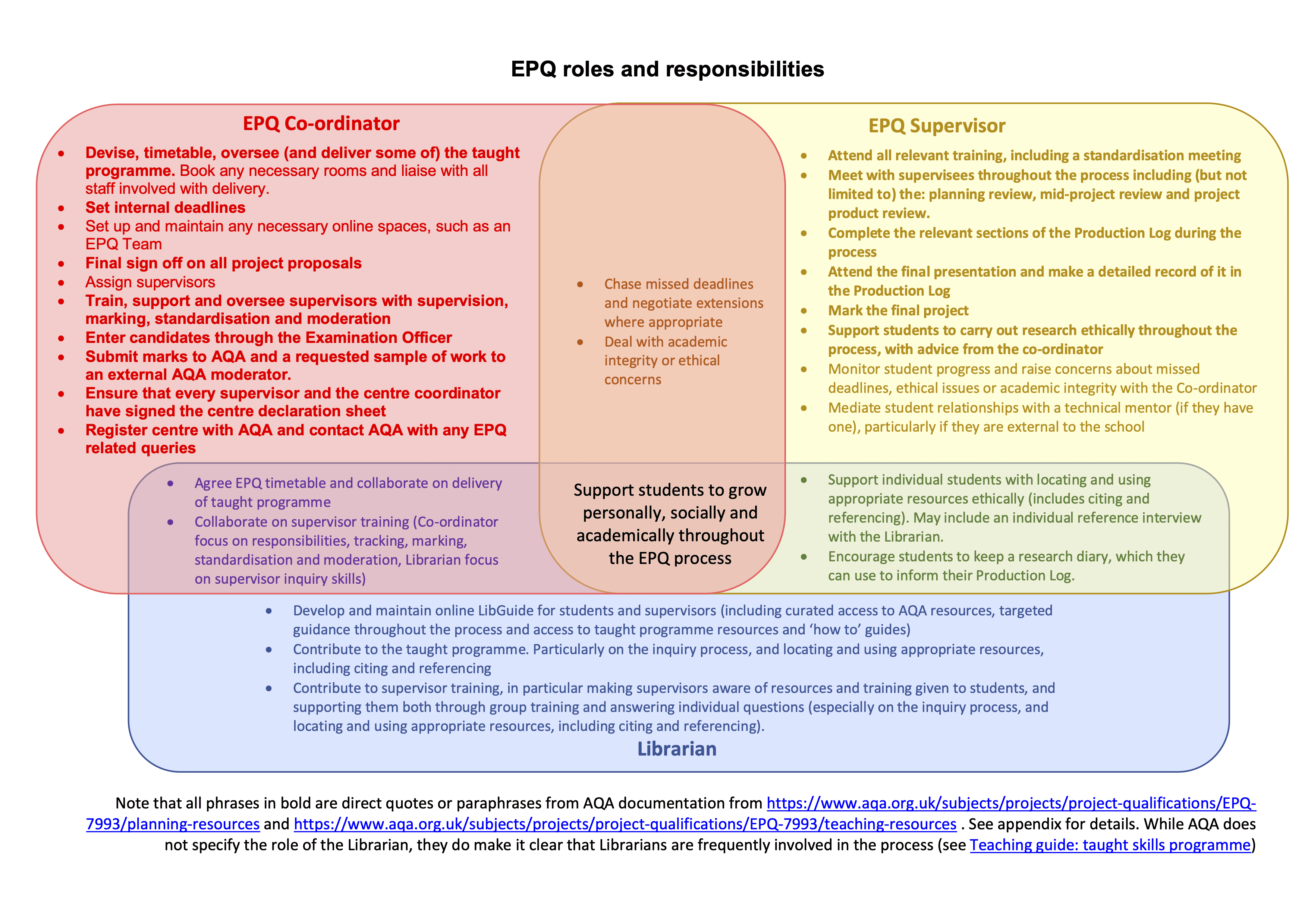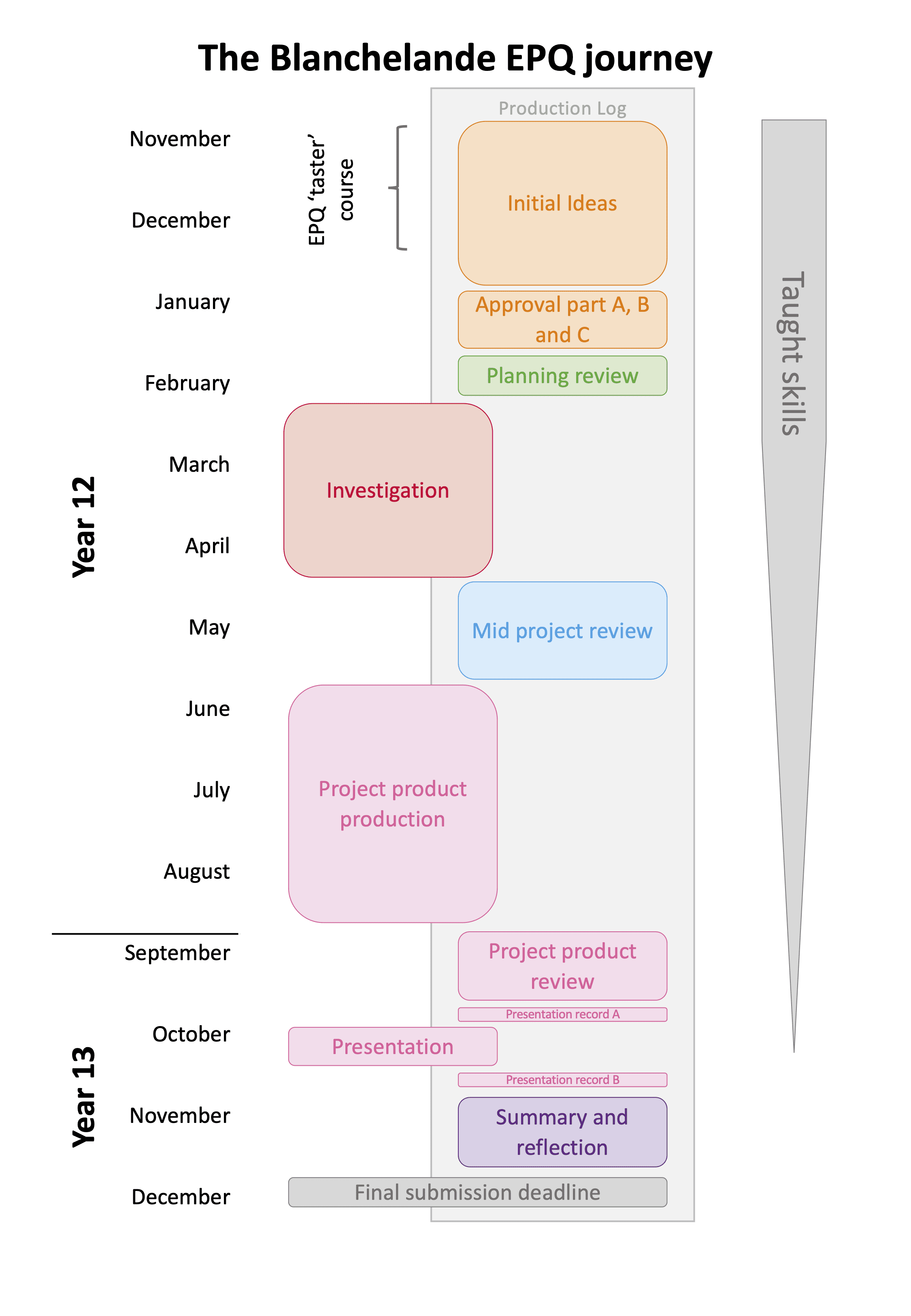Reply To: FOSIL and the Extended Project Qualification (EPQ) [Closed. Use Extended and Higher Project Quliafications Topic]
Home › Forums › Inquiry and resource design › FOSIL and the Extended Project Qualification (EPQ) [Closed. Use Extended and Higher Project Quliafications Topic] › Reply To: FOSIL and the Extended Project Qualification (EPQ) [Closed. Use Extended and Higher Project Quliafications Topic]
We moved schools (and countries) over the summer and are now at Blanchelande College on Guernsey. An exciting learning opportunity this move has brought is the chance to develop EPQ provision from two perspectives as I have been appointed both a Librarian and the EPQ Co-ordinator. Blanchelande is not an IB school so I am no longer involved with the Extended Essay, but the school has a very new sixth form so I have the opportunity to design the EPQ provision from scratch, building on my experiences with independent inquiry in the EE and with starting to support Chris with the EPQ at Oakham. I am very aware that the EPQ has some very significant differences in structure and delivery to the EE so have been reading and attending as much training as I can. AQA run some excellent free courses, but only allow one person to attend from each centre per exam session, so being a brand new co-ordinator it has made sense for me to attend.
I’m painfully aware that there is only so far that reading and courses can get me, so I’m going to post as much as I can of my journey here in the hope of drawing on the wisdom of those of you who already have considerable experience in supporting the EPQ as Librarians, Supervisors, Co-ordinators or some combination of all three. Here are some of my initial thoughts:
- Before I was appointed Co-ordinator I was trying to clarify the ‘triangle of support’ for the EPQ for our senior management (based partly on a similar diagram I produced for the Extended Essay). Diagram below. I would be very interested in any feedback. This is now complicated by the fact that I am both Librarian and Co-ordinator for Year 12, and Librarian, Co-ordinator and Supervisor for Year 13 (we have quite a small cohort), but it is important for me to understand the different roles. I was very encouraged to hear the AQA Chief Examiner telling both Co-ordinators and Supervisors on the courses I went on over the last two weeks how important Librarians are to the process and that they should be involved in the taught element.

- In picking up the Year 13 students (our first EPQ cohort) who were all stuck at various stages, it struck me how important a deep understanding of inquiry is here and why the Librarian has an important role in the process. For example:
i. One student was still stuck in Connect. He had a wide range of interesting superficial stimulus resources (photographs) and was still in the process of finding more, but seemed unable to focus his interest on a topic that would be reasonable to cover in 5000 words and needed some support to focus. He needed support to Wonder about his images and generate suitable questions for futher exploration.
ii. A second student had a really good idea for a question but was struggling to find resources for the Investigate stage. Without giving him specific resources I pointed him towards banks of scholarly resources he could access and local library options to help him get unstuck.
iii. Another student was starting to write while she was still gathering resources (because she’s “not really a planner”….) and needed help to understand the importance of Constructing her ideas.
iv. A fourth student was stuck in a cycle of refining and refining her artefact based on feedback and had lost sight of the fact that she needed to put a time limit on this and begin to Express her research in her 1,000 word report.
Understanding which inquiry stage each student was stuck at both helped me to unstick them AND gave me ideas about how to plan the Year 12 course to pre-empt some of these issues next year. I’d love to hear where your students tend to get stuck and how you help them.
- I started delivering the 30 hour taught element of our course this week. Because it is optional for us it is off-timetable, so I checked with all the students who were interested and then put it on as a 1 hour a week after school activity, with the expectation that they then put in at least another hour a week of independent study themselves during term time, and 2 hours a week during holidays (to make up to the 90 hour independent study element). I am so excited about this because I have so much more (and more regular) contact with these EPQ students than I did with the EE students. I can genuinely design and run a hands on ‘taught course’ rather than needing to deliver this through 3 lecture style seminars and 2 workshops. It also feels like quite a responsibility though. In order to get started I had to rough out the whole course so that I know what I’ll need to get done by when and so that I can be clear with the students. First I came up with a general course outline (below – credit to AQA as this builds on and refines their process diagram), before beginning to produce a very rough week-by-week plan. What do others think? How does my proposed outline compare with what you do?

The introductory session with eight students went really well this week, and they began brainstorming ideas and interests to make a start towards a topic. I’m out of time this week, but will post how I’m getting on as I go along. Next week as well as the regular Year 12 activity I need to check in with Year 13 (as I’m supervising all 5 of them) AND I’ve got a ½ hour ‘lecture stye’ session with 50 Year 11s to introduce the idea of the EPQ to them as part of a sixth form taster day….. I’d love to hear any ideas for ‘activities’ that might work with groups of 50 in a hall as I don’t really want to just talk at them for half an hour, and I want them to come away really excited about the idea of an EPQ
Looking forward to hearing everyone’s thoughts!


